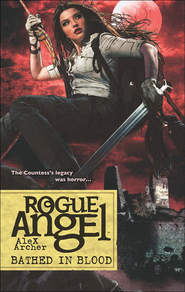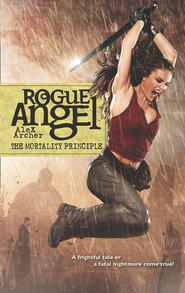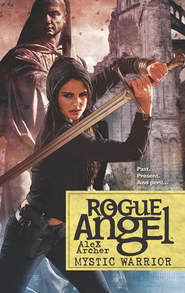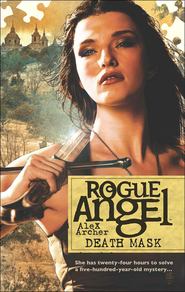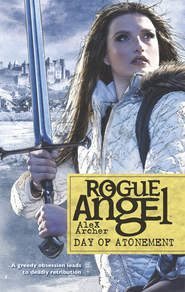По всем вопросам обращайтесь на: info@litportal.ru
(©) 2003-2025.
✖
The Matador's Crown
Автор
Год написания книги
2019
Настройки чтения
Размер шрифта
Высота строк
Поля
She watched as the parade of banderilleros and picadors preceded the next matador into the ring. “Can you get more information for me?”
“Why? Who was Diego Montera to you?”
“I didn’t know him. But this hit close. As I’ve said, I had only recently unearthed the bull statue.”
“Alas. I so had hopes for your descent into nefarious deeds.”
“We can’t all be unscrupulous like you, Garin.”
“Of course not.”
“I took pictures.”
“Ah, there’s my girl.”
“The Cádiz police erased them from my camera.”
He gave her a look that said “did you expect anything less?”
“The murder isn’t my concern,” she said. “But it could aid my investigation into the stolen artifacts. I know you have connections. I wouldn’t ask if I couldn’t get answers some other way.”
He nodded, but didn’t say he would look into it for her. Annja marked her request off as Ignored. It was a lot to ask. But generally he didn’t mind helping her, so his silence gave her concern.
Garin leaned forward, resting his elbows on his pale linen pants. His attire was de rigueur for hot Spanish summers. He wore the look well, but then he always seemed to blend into any situation or country. Despite his size and sometimes menacing presence, he had that everyman look.
Cheers erupted around them, and Annja turned her attention to the ring. The matadors spilled out onto the sand ring in suits of black and blue and violet. The man she pinpointed as the principal matador wore a brilliant gold traje de luces or “suit of lights,” along with a black felt montera hat, fuchsia stockings and the classic black flat shoes that reminded her of ballet slippers.
“That’s Manuel Bravo, simply called El Bravo. Fearless. He is this generation’s greatest bullfighter from Cádiz,” Garin explained. “He completed one hundred corridas last year and is on schedule to do the same this season. The man’s a marvel.”
One hundred fights in one season was a marker the pro matadors worked toward. It was an elusive goal, but those who made it were honored and guaranteed a full fight schedule the following season. A great matador could earn up to twenty-five thousand for one fight, so a hundred fights in a season added up nicely.
Annja couldn’t share the excitement the surrounding crowd displayed as they cheered and waved white handkerchiefs and colorful scarves at the matador.
“Though I’m not willing to get out a flag and protest,” she said, “I’m not sure how I feel about the blood sport.”
“It is not a sport, Annja,” Garin reprimanded her. He tilted his beer bottle toward the ring. “Bullfighting is an art, a spectacle. But never a sport.”
“Okay. I defer to your expertise to explain it to me.” Crossing her arms and leaning back in the chair, she braced herself to be convinced.
“I will do my best, but you must know there are over thirty different ways to describe the placement of the torero’s sword according to depth, position and entry point. Tauromachy is an elaborate art. I think we’ll just enjoy it today, okay?”
Right now it wasn’t the matador who swung the cape before the hulking bull, but rather a banderillero dressed in a smart red costume detailed with jet beading. El Bravo stood off beside a portion of wood fence, a barrier the matadors could flee behind during a bull’s attack. The matador was tall and slender. Regal in his suit of lights, he studied each move the bull made as his assistant goaded the animal with the magenta-and-yellow cape.
“Why doesn’t El Bravo test the bull himself?” she asked.
“That’s his assistant’s job. El Bravo needs distance to take it all in. Looking for which horn the bull favors, and whether or not the beast charges straight and with its head down or high. This one is calm. A good bull.”
“How would you know a bad bull?”
“Those cartoons that feature the snorting bull that paws the ground with a hoof? That is a bad bull. Too cocky and fearful. Easily riled and nervous. The matador desires a calm, brave animal to put him to the ultimate test.”
“The bull being an herbivore,” she mused, “it’s surprising they charge a man at all.”
“Rhinoceroses are herbivores. I wouldn’t want to stand alone before one of those tanks.”
“Point made.” Annja noted the matador’s keen eye on the bull as it lowered its head to charge the cape. “Do they know what they’re getting before the bull comes to the ring?”
“Not usually. The bulls are selected before the fight in the sorteo. The matador never does the selection. He sends his second in command, who pays close attention to horn size, sharpness and shape. But it’s difficult to determine the animal’s mien in a small stockyard.” Garin finished off the beer. His attention swerved to her. “I assume you’re going to stick around and look into the murdered man’s life?”
“Like I said, I’ll leave that to the police. It’s curious, if you ask me, that someone would leave behind a piece such as the bronze bull at the scene. Even if the murderer had no idea the value of the object, he—”
“Or she,” Garin interjected.
“Or she, should have been able to take one look at it, known it was an artifact and pocketed it.”
“Perhaps their morals for stealing were stronger than for taking another man’s life?”
“That makes no sense.”
“Why? I’m not much for theft myself. Yet if faced with a situation where I had to defend my life by taking another’s life, I wouldn’t question the choice.”
“Are you suggesting whoever killed Diego did it in self-defense? A knife to the back is hardly a defensive wound.”
“No. Just showing you there are many ways to reason a man’s actions.”
“Explain to me, then, a man’s choice to watch another man murder an animal before a crowd?”
“Ah, but it’s not a defenseless animal. Name one other situation where an animal raised for slaughter is allowed the opportunity to defend its life?”
Annja opened her mouth to reply, but said nothing. He had a point. A vague, far-reaching point.
“Besides, the man isn’t safe from danger,” he added. “The matador faces danger for us all. He offers us that risk we are unwilling to take for the thrill of near death.”
“This coming from a man who I know takes risks daily.”
“Well.” Garin shrugged. “I’m speaking about the others.”
The common people was the unspoken part he left out. So like Garin, and not at all offensive when delivered with his charming smirk.
The matador had stepped out from behind the fenced barrier and swirled the magenta-and-yellow cape to attract the bull’s attention. The cape moves were called veronicas, named after the veil Veronica had used to wipe the sweat from Jesus as he marched to his doom.
“Left horn,” Garin muttered. “He’ll present the cape to that one because that’s the dominant one.”
The crowd cheered when the bull passed close to the matador, one deadly ebony horn brushing his hip. The matador didn’t step back, but instead leaned in toward the bull, bringing man and beast together as one. The bravery required to maintain that stance and not step aside was incredible, at once brutal and graceful. Annja nodded, impressed.
“As I’ve said, bullfighting is an art,” Garin said into her ear to be heard over the approving shouts of “Olé.”
And yet the word matador translated to killer. Annja took another sip of her beer, avoiding comment.






